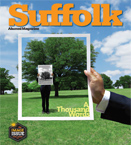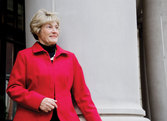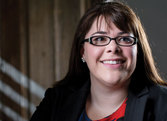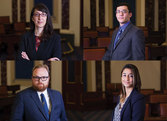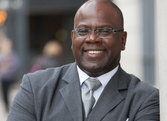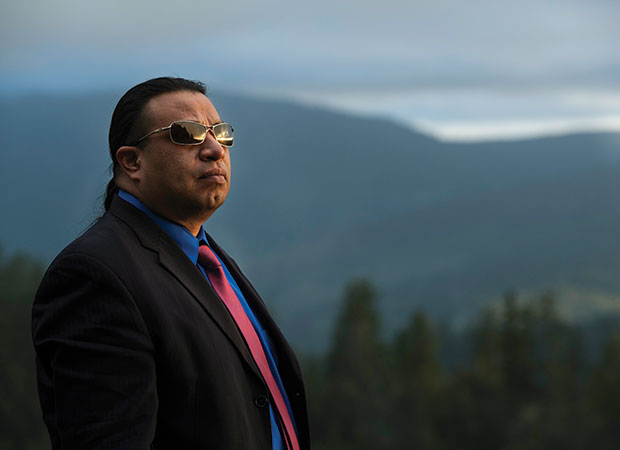
Road Warrior
For Javier Kinney JD ’04, self-governance director for California’s largest indian tribe, the path to sovereignty is paved with asphalt.
By Deidre Pike
As a member of California’s Yurok tribe, Javier Kinney was breaking a 300-year-old law when he began attending law school in Boston in 2001. A 1675 law banned indigenous people from entering the city unless escorted by two musketeers. “I came into the city every day, worked, studied, and enjoyed my time in Boston,” says Kinney, now director, Office of Self-Governance for the Yurok, California’s largest Indian tribe. “But at the same time, there was a disconnect. And nobody really thought about it.”
He thought about it, though, about how this antiquated law applied to him. “It demonstrated the deep-down ignorant consciousness that our society still has with regard to the treatment of Indian people,” he says.
While a Suffolk student, Kinney co-founded the school’s Native American Law Student Association (NALSA) chapter, which observed its 10-year anniversary this spring. The three-member chapter has grown to 46 members today. Kinney also hosted a well-attended forum on Native American sovereignty in 2003 and organized the first Suffolk University Law School Tribal Conference in 2004.
“Javier really informed the rest of us about issues that tribal communities face,” recalls fellow law student Nicole Friederichs, practitioner-in-residence at Suffolk’s Indian Law and Indigenous Peoples Clinic. The two were in Suffolk law professor Lorie Graham’s indigenous peoples law class in 2003.
Friederichs lauds the lasting impact of Suffolk’s NALSA chapter. “If you fast-forward 10 years later, you see how Suffolk’s turned into this place, right now, where these issues are being discussed in New England.”
In 2004, the year Kinney received his law degree from Suffolk, Boston Mayor Thomas Menino sought the repeal of the 329-year-old ban on unaccompanied indigenous individuals. Governor Mitt Romney signed the repeal, calling it an end to a painful chapter in Massachusetts’ history. That’s the type of conciliatory action for which Kinney now works.
Kinney manages governmental affairs for the Yurok, working with local, state, federal, and international governments to advance tribal sovereignty. Depending on the day you catch him, this might mean working on public safety and health issues with the county supervisors, the governor’s office, or the Bureau of Indian Affairs. Or he might be strategizing with neighboring tribes and private-sector business officials.
“My job is to bring stakeholders together,” Kinney says. “Sometimes those parties have been historically adversarial. But we’ve been successful, during these challenging political and economic times, in bringing about more cooperative actions.”
Kinney received a bachelor of arts in history and Native American studies from the University of California, Davis, his father’s alma mater, in 1997. His interest in public policy and international affairs was piqued when recruiters from Tufts University offered him a chance to attend the Fletcher School of Law and Diplomacy. He received a master’s there in 2000. His passion for environmental and indigenous law brought him to Suffolk, where he studied with Graham, interned for an attorney representing the Aquinnah Wampanoag Tribe, and worked as a research assistant on energy law topics for Professor Steven Ferrey.
“His general thoughtfulness was beyond the norm of the typical student,” Ferrey recalls. “He seemed to have a real sense of where he was going and why.”
After graduation, Kinney returned to the West Coast, where he worked as senior policy analyst for the San Manuel Band of Mission Indians, near Los Angeles. When a position as transportation manager opened with the Yurok in 2008, Kinney took the job and moved 11 hours north to Weitchpec, California, where he’d grown up. Kinney says his Suffolk experience complemented his nontraditional approach to problem solving. Meeting people from all around the world and from all walks of life in Boston fueled his insistence on enlisting forces from outside the tribe.
“Javier made it a point to engage others who weren’t aware of tribal sovereignty or Indian law issues generally,” recalls Graham. “And always with a smile on his face.”
She says she knew he’d be a success in any job he chose. “He could have stayed anywhere and gone anywhere,” she says, “and he went home, which says a lot about him.”
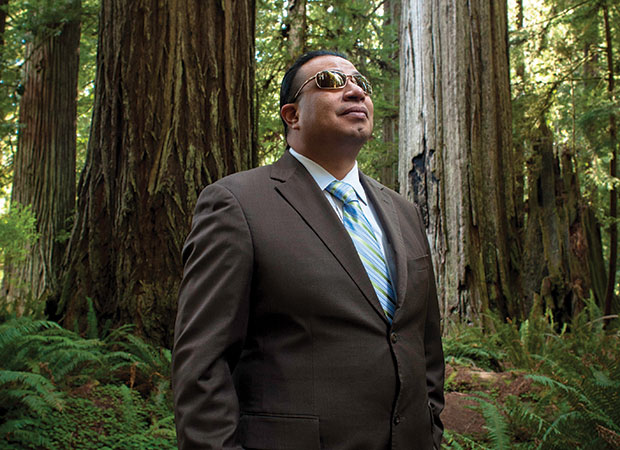
Smoke-Signal Days
On a bridge, high over the juncture of the Trinity River with the larger Klamath River, Kinney points to where a pair of eagles nest. A car drives by and Kinney waves to its driver. Everyone knows everyone in Weitchpec, population 150. Strike that number. A single father of two, Kinney moved his family back here in 2008. “The population sign should say 153,” he says, smiling. Welcome to Yurok Land, Aiyyu-kwee’ (hello), where Kinney’s extended family lives on both sides of the rivers.
Home has its challenges.
Unemployment lingers around 80 percent on the upper reservation, near Weitchpec. Transportation issues compound a lack of industry. It’s more than 60 miles to the college town of Arcata. It’s a one-and-a-half-hour drive on twisting, partially unpaved Bald Hills Road to the tribe’s offices and businesses in Klamath. Swaths of homes don’t have electricity, phone service, or Internet connectivity. “We’re still living in smoke-signal days,” Kinney says.
But signs of progress abound. Plans to build a visitor center and a tribal justice center are in the works for Klamath. Another six-mile section of Bald Hills Road was paved recently, and three more miles will be paved this year. A transit system now serves the area. Electric lines are being installed.
Kinney helped the tribe negotiate the reacquisition of 22,000 acres of ancestral land from a timber company. He’s working to acquire funds for another 24,000 acres. His role includes economic development, strategic planning, public safety, and legislative advocacy. With his efforts, roads have been paved and rickety bridges replaced. The tribe has joined efforts of farmers, fishermen, and conservationists in pushing for the removal of four hydroelectric dams on the Klamath River in California and Oregon by 2020. Tribal members also approved the construction of a 60-room hotel with an adjoining casino in Klamath. The hotel-casino will be funded by a $9.6 million portion of a $27.5 million settlement in the Nez Perce v. Salazar class-action lawsuit, which found the federal government had mismanaged trust funds and natural resources of more than 40 tribes.
Kinney was part of the negotiation team. The hotel-casino will create at least 100 jobs and provide opportunities for Yurok entrepreneurs, Kinney says. The goal is to diversify the tribe’s investment portfolio and become less dependent on grants and government funding. Kinney notes the tribe’s businesses—including its fisheries, waterfront campgrounds, and the Pem-Mey Fuel Mart in Klamath—now account for only about 10 percent of the Yuroks’ income. That, says Kinney, needs to change. Self-governance means self-sufficiency. Given the number of tourists who come to the redwoods annually, this dynamic will change, he says.
“We’re remedying these problems now,” Kinney says. “We’re resolving it. That’s what sovereignty is about.”
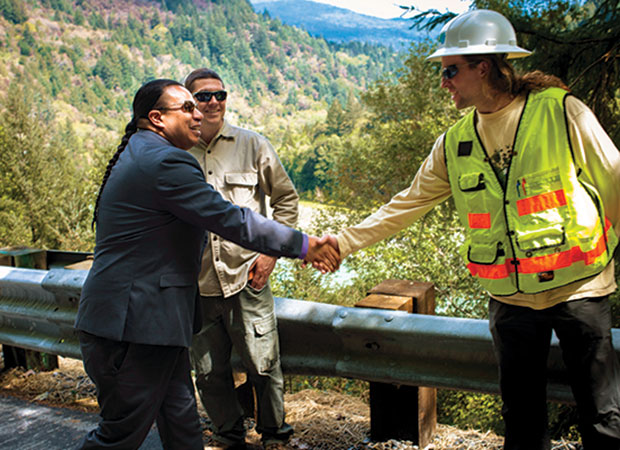
A Contagious Fire
On a snowy March morning, Kinney’s 50-mile drive from Weitchpec to Klamath takes more than two hours. Four-wheel drive helps navigating the unpaved portions of the road.
Reaching his office in the lower reservation, Kinney calls organizers of an elder food distribution program to warn them about the road. Kinney’s schedule is packed with conference calls to government officials, tribal leaders, and consultants. Today, he’s making tribal council presentations and working on long-term elder care plans. Managing governmental affairs for the Yurok involves long hours strategizing to advance tribal sovereignty, he says. He logs plenty of miles, traveling to Sacramento and Washington, D.C. frequently.
For work, Kinney dons a suit and tie and pulls his long dark hair back into a ponytail. He wears designer eyeglasses, a silver bracelet, and his Hoopa High School class ring. He attended high school on the neighboring Hoopa reservation, earning county honors for football and baseball prowess.
“I wasn’t the best, but I played hard and worked hard,” he says. “Sports taught me a lot about being a leader and being part of a team.” Kinney is the oldest of three sons, all inspired to attend college by their mother, Laura, and father, Robert, one of UC-Davis’ first Native American studies students.
“We always believed that education was the most important thing for them,” Laura Kinney says. “All three of the boys did not have a choice. It was not, ‘You can either work or do school.’”
Javier Kinney was born in Woodland, California, while his dad was at UC-Davis. His mother recalls pushing her infant son through a supermarket. He was a social child, intent on making connections. “He would say hello to everyone,” she says. Occasionally, an individual would not respond. “Javier would reach out, and he would touch them and say again, ‘Hello.’”
Robert Kinney became an elementary school teacher and coached his sons’ sports teams. “In order to play sports, we had to get good grades,” Javier Kinney recalls. Kinney now coaches youth sports, including his 10-year-old daughter Jasmine’s softball and basketball teams and his 12-year-old son Kokonow’s basketball, baseball, and football teams. Love for his family drives Kinney’s passion for his job. On display in Kinney’s Klamath office are diplomas from UC-Davis, Tufts, and Suffolk. At the center is a smaller diploma from Hoopa High. Tribal council member Sid Nix, who represents the Weitchpec area, praises Kinney’s decision to move back to Yurok country after receiving a pile of higher degrees.
“Not everyone comes back,” Nix says. “Javier’s in the culture and he’s doing both worlds. Where the tribe’s at right now, it’s time to move ahead. Javier’s respectful and he knows a lot of people. He’s trying real hard to make positive changes.”
One such change came during Kinney’s stint as transportation manager. In the 1960s, four bridges on Highway 169 were wiped out in a major flood. Wooden bridges had been erected as temporary solutions, intended to handle traffic for a year or two. Nearly 50 years later, the temporary bridges were still in place. Bridge repairs topped Kinney’s agenda as transportation manager in 2008. Kinney’s success demonstrates his ability to get things done, says Joe James, current transportation manager.
“Javier doesn’t sit around playing the blame game,” James says. Instead, Kinney cultivates relationships with decision makers. “He’d say, ‘If we don’t know them, we’ll travel to Sacramento and meet them. Let’s go to their headquarters and knock on their doors.’” The strategy worked. Four new bridges were completed last year. The tribe held a dedication ceremony in December.
“It should have been fixed a long time ago,” Kinney says. For too long, he contends, local and federal governments found it expedient to ignore or dismiss tribal members. “The Yurok Tribe’s no longer going to sit in the back seat. We’re going to move forward and be included in all day-to-day operations on and near the reservation ... The shy Indian doesn’t work around here.”
James likens Kinney’s passion to a contagious “fire”—one that inspires others to work long hours and consider every possible way of solving a problem. “We want to make an impact on people’s lives, not just do our jobs,” James says. “Sometimes it’s easier to stagnate, but Javier finds solutions. On the trail, you don’t see too much of that.”




